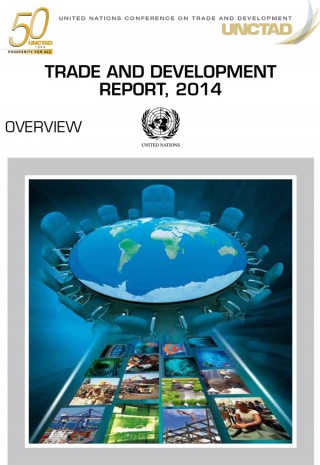The First United Nations Conference on Trade and Development (UNCTAD) was not only jubilant, but created permanent multilateral institutional structure with the aim of formulating principles and policies on international trade and related challenges of economic development in developing countries.
Fifty years later, UNCTAD’s 2014 Trade and Development report is calling “for changes in the way the global economy is ordered and managed.” What has transpired in the intervening five decades since UNCTADs inception in Geneva?
- In spite of globalization and the development of new technologies, inequality and poverty persist in most countries of the South where the path to sustainable and inclusive development has been elusive.
- In the report, the Secretary General of UNCTAD (a native of Kenya) calls on all peoples in the countries in the South to “rely on their own efforts to mobilize productive resources and, especially, to raise their levels of domestic investment (both public and private), human capital and technological know-how.”
Among other things, this requires individual countries in the South to determine which policies work in their particular conditions and which ones do not.
Pursuing such a sustainable and inclusive development strategy does not mean adopting a closed or insular attitude to the many development challenges. It is imperative that countries of the South have “access to external financial resources and technological know-how [that] is still critical to unlocking the development potential of many poorer and vulnerable countries.”
The global economy today is still in the economic doldrums inflicted during the 2008 financial economic meltdown. And thus, there is increasing danger that this is becoming accepted as the “new normal.”
It is also increasingly clear that as a result of insufficient global demand, international trade alone will not be able to ‘jump-start’ economic growth–especially in the global south. According to the report: “International trade has not slowed down or remained quasi-stagnant because of higher trade barriers or supply-side difficulties; its slow growth is the result of weak global demand” (P-6).
The report points out that “the way to expand trade at a global level is through a robust domestic demand-led output recovery at the national level” (P-6).
More importantly, UNCTAD has proposed the “balanced growth” scenario as providing a way for countries especially in the South to escape from current global economic doldrums.
According to the report, “The balanced-growth scenario introduces the following elements: incomes policies to support growth of demand on a sustainable basis; growth-enhancing fiscal policies; industrial policies to promote private investment and structural transformation; regulation of systematically important financial institutions and capital controls to stabilize global financial markets; and development- oriented trade agreements” (P-10).
Major challenges towards a new development agenda- discussions under way on the new 2030 Millennium development goals seem to “signal a level of ambition well beyond the [2015] Millennium Development Goals” (P-12).
More importantly, the discussions seem to underscore a strong desire for a “new deal” that can achieve the promise of “Prosperity for All” within the global context.
The new approach faces three Major challenges:
- Challenge of aligning new goals and targets to a (potentially new) policy paradigm that can help raise productivity and per capita incomes everywhere as well as generate decent jobs and deliver reliable and quality public services;
- The need for a new development agenda that seeks to reduce massive inequality and poverty and a achieve inclusive sustainable development; and
- Ensuring that effective policy instruments are accessible to countries in the South to enable them to achieve the agreed goals and, thereby, advance the new development agenda.
According to the report, this means: “Restoring a development model that favours the real economy over financial interests, puts sustainability ahead of short-term gains and truly seeks to achieve prosperity for all…” (P-13).


Comments are closed.